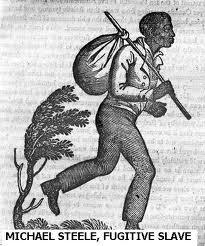During twenty years of active journalism in New York I have found it to be true that the successes we achieve in life, of whatever character, usually cost us so much in effort and anxiety that very little capacity for the enjoyment of the fruits of our labors is left us.
Timothy Thomas Fortune was born October 3, 1856 in Marianna, Florida. He was educated at the first Freedmen's School in Florida and served as a page in the State Senate before apprenticing at a Jacksonville newspaper. After studying journalism for a year at Howard University he worked at the
People's Advocate newspaper in Washington, D.C. before relocating to New York City in 1881.
Fortune then worked as a printer and editor for several newspapers before acquiring financing in 1884 to establish his own paper,
The New York Globe, later known as
The New York Freedman and
The New York Age. Also in 1884 he published his first book,
Black and White: Land, Labor and Politics in the South, a vivid description of the discrimination and racism of the post-Reconstruction era. His writing appeared in 30 books, including a volume of poetry,
Dreams of Life, in 1905.
In 1890 Fortune led a meeting of over 100 delegates from 23 states to form the
National Afro-American League, which he had proposed in an earlier editorial as a "national all-black coalition of state and local chapters to assert equal rights and protest discrimination, disenfranchisement, lynching, and mob law." The League only lasted four years but was revived in 1898 as the National Afro-American Council, which again met with little success yet stayed in existence long enough to serve as a fore-runner of the
Niagara Movement. Fortune is credited with being the first person to use the term "Afro-American."
Although after the death of
Frederick Douglass in 1895 Fortune was considered the most outspokenly militant African American in the North, he frequently collaborated with
Booker T. Washington, editing for Washington and promoting his views in the
Age. This stance led to criticism and decreased revenue for the paper, and after years of heavy drinking Fortune suffered a nervous breakdown in 1907. His biographer,
Emma Lou Thornbrough wrote that "unable to bend as Washington had, he was broken." Washington, as a major stockholder, took control of the
Age, later selling it to Fred R. Moore. It continued to be published until 1960.
Fortune gradually recovered and worked at newspapers in Philadelphia, Washington, and Indianapolis, and in 1923 became editor of
Marcus Garvey's
Negro World. He died in Philadelphia on June 2, 1928 at the age of 71.
Bartow Black
’Twas when the Proclamation came,—
Far in the sixties back,—
He left his lord, and changed his name
To “Mister Bartow Black.”
He learned to think himself a man,
And privileged, you know,
To adopt a new and different plan,—
To lay aside the hoe.
He took the lead in politics,
And handled all the “notes,”—
For he was up to all the tricks
That gather in the votes;
For when the war came to a close
And negroes “took a stand,”
Young Bartow with the current rose,
The foremost in command.
His voice upon the “stump” was heard;
He “Yankeedom” did prate;
The “carpet-bagger” he revered;
The Southerner did hate.
He now was greater than the lord
Who used to call him slave,
For he was on the “County Board,”
With every right to rave.
But this amazing run of luck
Was far too good to stand;
And soon the chivalrous “Ku-Klux”
Rose in the Southern land.
Then Bartow got a little note,—
’Twas very queerly signed,—
It simply told him not to vote,
Or be to death resigned.
Young Bartow thought this little game
Was very fine and nice
To bring his courage rare to shame
And knowledge of justice.
“What right have they to think I fear?”
He to himself did say.
“Dare they presume that I do care
How loudly they do bray?
“This is my home, and here I die,
Contending for my right!
Then let them come! My colors fly!
I’m ready now to fight!
“Let those who think that Bartow Black,—
An office-holder, too!—
Will to the cowards show his back,
Their vain presumption rue!”
Bartow pursued his office game,
And made the money, too,
But home at nights he wisely came
And played the husband true.
When they had got their subject tame,
And well-matured their plan,
They at the hour of midnight came,
And armed was every man!
They numbered fifty Southern sons,
And masked was every face;
And Winfield rifles were their guns,—
You could that plainly trace.
One Southern brave did have a key,
An entrance quick to make;
They entered all; but meek, you see,
Their victim not to wake!
They reached his room! He was in bed,—
His wife was by his side!
They struck a match above his head,—
His eyes he opened wide!
Poor Bartow could not reach his gun,
Though quick his arm did stretch,
For twenty bullets through him spun,
That stiffly laid the wretch.
And then they rolled his carcass o’er,
And filled both sides with lead;
And then they turned it on the floor,
And shot away his head!
Ere Black his bloody end did meet
His wife had swooned away;
The Southern braves did now retreat,—
There was no need to stay!









































